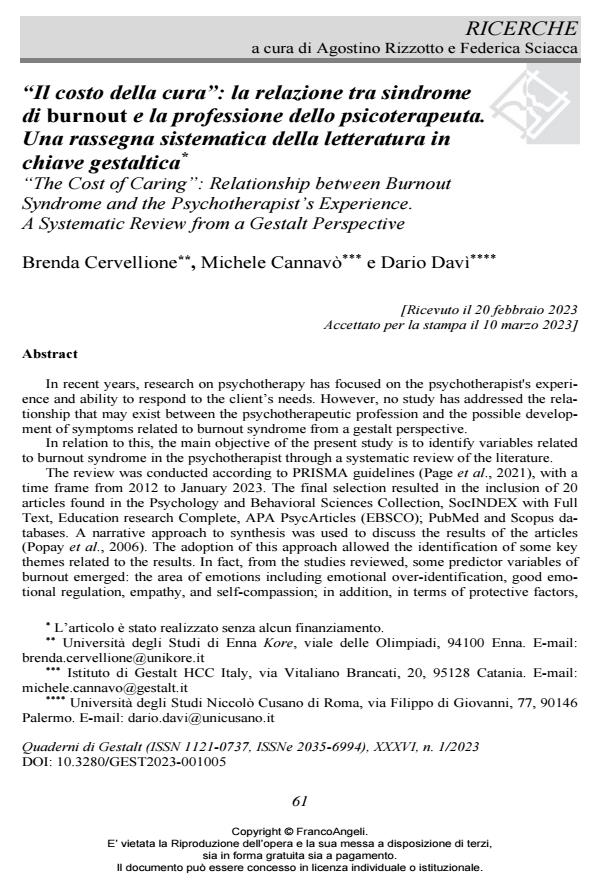"The Cost of Caring": Relationship between Burnout Syndrome and the Psychotherapist’s Experience. A Systematic Review from a Gestalt Perspective
Journal title QUADERNI DI GESTALT
Author/s Brenda Cervellione, Michele Cannavò, Dario Davì
Publishing Year 2023 Issue 2023/1
Language Italian Pages 18 P. 61-78 File size 300 KB
DOI 10.3280/GEST2023-001005
DOI is like a bar code for intellectual property: to have more infomation
click here
Below, you can see the article first page
If you want to buy this article in PDF format, you can do it, following the instructions to buy download credits

FrancoAngeli is member of Publishers International Linking Association, Inc (PILA), a not-for-profit association which run the CrossRef service enabling links to and from online scholarly content.
In recent years, research on psychotherapy has focused on the psychotherapist's experi-ence and ability to respond to the client’s needs. However, no study has addressed the rela-tionship that may exist between the psychotherapeutic profession and the possible develop-ment of symptoms related to burnout syndrome from a gestalt perspective. In relation to this, the main objective of the present study is to identify variables related to burnout syndrome in the psychotherapist through a systematic review of the literature. The review was conducted according to PRISMA guidelines (Page et al., 2021), with a time frame from 2012 to January 2023. The final selection resulted in the inclusion of 20 arti-cles found in the Psychology and Behavioral Sciences Collection, SocINDEX with Full Text, Education research Complete, APA PsycArticles (EBSCO); PubMed and Scopus databases. A narrative approach to synthesis was used to discuss the results of the articles (Popay et al., 2006). The adoption of this approach allowed the identification of some key themes related to the results. In fact, from the studies reviewed, some predictor variables of burnout emerged: the area of emotions including emotional over-identification, good emotional regulation, empa-thy, and self-compassion; in addition, in terms of protective factors, variables such as good resilience skills, adequate training during training, personal psychotherapy, and supervision emerged. Among the major findings that emerged from the review is that the variables “empathy” and “bodily resonance” seem to be factors of fundamental importance in order to be able to establish a better quality of the therapeutic relationship. This result is fully in line with data already obtained from Gestalt psychotherapy research on therapist responsiveness and intui-tion (Spagnuolo Lobb et al., 2022a). Consequently, a better quality of the therapeutic relation-ship predisposes to a good perception of one’s quality of life in reference to the work aspect. In conclusion, a common goal to be achieved to mitigate the potential negative effects of stress in clinical settings could be to implement professional development activities from intervision and clinical supervision, supporting aesthetic and field resonance (Spagnuolo Lobb et al., 2022b).
Keywords: Gestalt therapy, burnout, systematic review, supervision, wellbeing.
Brenda Cervellione, Michele Cannavò, Dario Davì, "Il costo della cura": la relazione tra sindrome di burnout e la professione dello psicoterapeuta. Una rassegna sistematica della letteratura in chiave gestaltica in "QUADERNI DI GESTALT" 1/2023, pp 61-78, DOI: 10.3280/GEST2023-001005